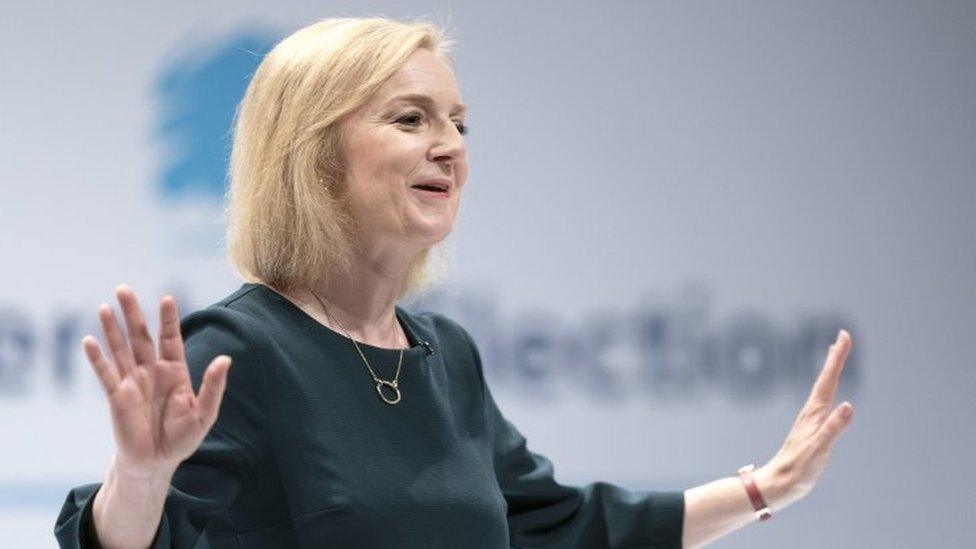Tory leadership contest: Under-18s who get to pick the next PM
- Published
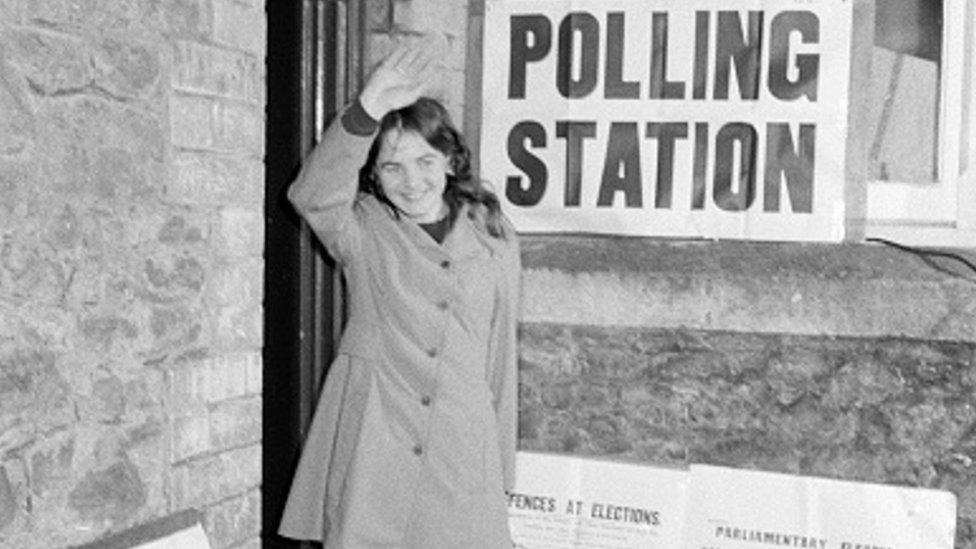
Trudy Sellick (pictured here) was the first 18-year-old to ever cast a vote in a UK election
By-elections rarely pique the nation's interest in the way one did in the sleepy market town of Bridgwater in Somerset.
The poll in 1970 marked the first time teenagers were allowed to participate in a UK election after the voting age was lowered from 21 to 18.
The Conservative candidate, future Cabinet minister Tom King, won in a victory partially attributed to the youth vote, with the party's then leader taunting Labour as out of touch.
These days teenagers routinely vote in elections of all kinds, including the Conservative ballot to pick who will succeed Boris Johnson as the next party leader and prime minister.
Except that, unlike in UK general elections, children as young as 15 can take part - the age at which they are eligible to join the Conservative Party and enjoy full voting rights.
The question of whether they should be able to do this - given that they would not be able to vote in a general election - is "a tricky one", says 17-year-old Tory member Aryan Ramkumar.
In step with the Conservative Party's 2019 manifesto, external, Aryan said he did not support extending voting rights to 16 and 17-year-olds in general elections.
While he cast his ballot in favour of Rishi Sunak for the Tory leadership, "I don't necessarily think we should be allowed to vote", Aryan said.
"It's important for people aged 16 and above to give their opinion and bring a fresh perspective," he said.
But the fate of the country, he reasoned, should not be up to under-18s who did not pay taxes, have mortgages or - in most cases - support families.
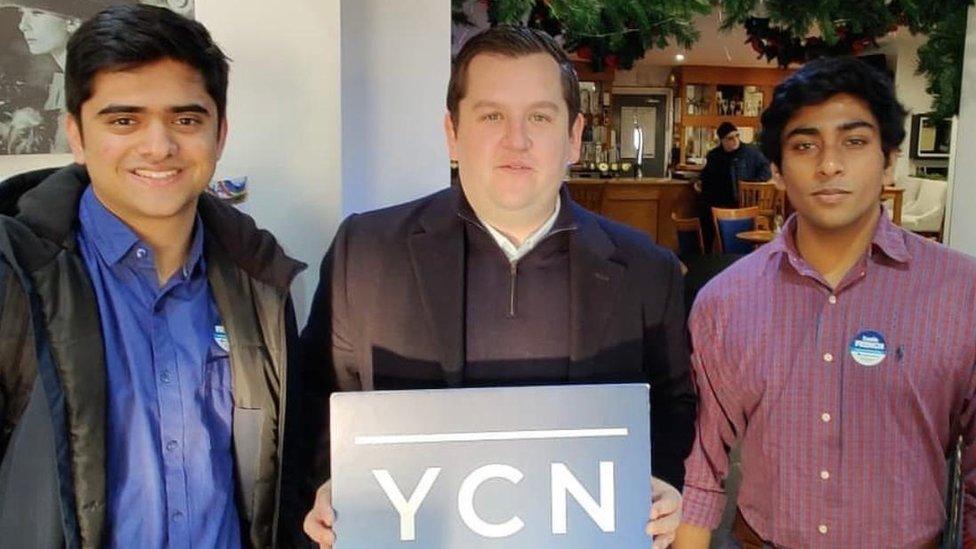
Aryan (pictured here on the right) said Mr Sunak had the integrity and experience to lead the party
Aryan, who is from London but goes to a boarding school elsewhere in England, said while he had "always had this sort of right-wing ideology", he became more engaged with Conservatives politics after Brexit.
Galvanised by the UK's departure from the EU, he joined the party and the Young Conservative Network last year and has since been involved in campaigning.
Among fellow young Tory members, the leadership contest has been a hot topic of debate.
He has been making the case for Mr Sunak, who was "someone of integrity", whereas his rival Liz Truss "has this utopian fantasy economy in mind".
Although, he added, not all under-18 members "have the full idea of what's happening".
That view appears to be widely held within the ranks of the Young Conservative Network, which has hundreds of members.
One of them is 16-year-old James Hawkes, who first became interested in politics in the build-up to the 2019 general election, before he joined the Conservatives earlier this year.
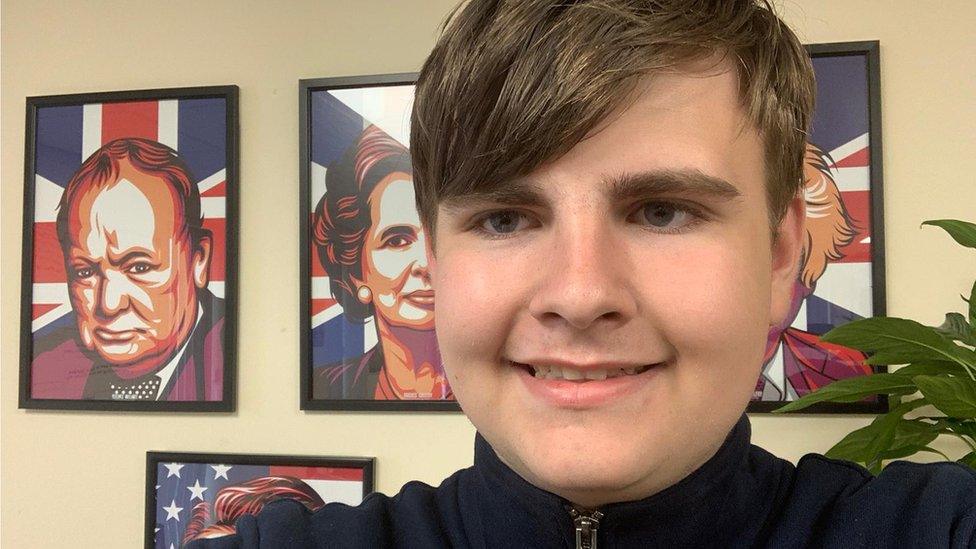
James has been working in the office of his local Tory MP, Matt Vickers, over the summer
Ms Truss got his vote because "she's got better policies" than Mr Sunak and has "shown better ability to be prime minister, especially on the world stage", he said.
A student of politics and economics from Stockton-on-Tees, James believed there was a big difference between voting in Tory leadership ballots and general elections.
"If you're a Tory member under 18, you are paying to be there and will almost certainly have the political knowledge," he said.
But there was a risk of "undue influence if you don't have the political knowledge", he added, claiming the majority of under-18s did not.
Politically informed or not, teenagers are unlikely to have a decisive impact on the leadership contest any way, as research suggests, external the overwhelming majority of Tory members are aged over 45.
Even so, the party's political opponents detect a whiff of double standards.
No Young Conservatives in favour of giving votes to under-18s were available for comment, but Young Labour activist Hasan Patel, 19, was.
He said giving 16-year-olds a vote in the Tory leadership ballot but not in general elections "shows quite a lot of hypocrisy" from the Conservative Party.
Consider, Hasan said, the enfranchisement of 16 and 17-year-olds in Scotland and Wales, where under-18s can vote in local elections and elections to the Scottish Parliament and Welsh Senedd.
Welsh elections 2021: Younger voting age welcomed by teens
Figures show, external that, as of December last year, there were 77,600 young people aged 16 or 17 registered to vote at Scottish Parliament and local elections, 1.8% of the total electorate. This was an increase of 4,300 (5.9%) on the previous year.
For the Scottish independence referendum in 2014, the franchise was expanded to 16 and 17-year-olds for the first time in the UK. Almost 110,000 registered to vote and 75% of those who spoke to the Electoral Commission claimed to have done so.
Importantly, the commission said in a report, external, 97% of those 16 and 17-year-olds "said that they would vote again in future elections and referendums".
Research on elections in Austria, external, the first European country to lower the voting age to 16, has shown evidence of youth motivation to participate in the democratic process as well.
These findings highlight "there is an appetite for young people to get engaged in the political system", Hasan said. And it is crucial they do, he said, because "the younger you are the longer decisions politicians make are going to impact you".
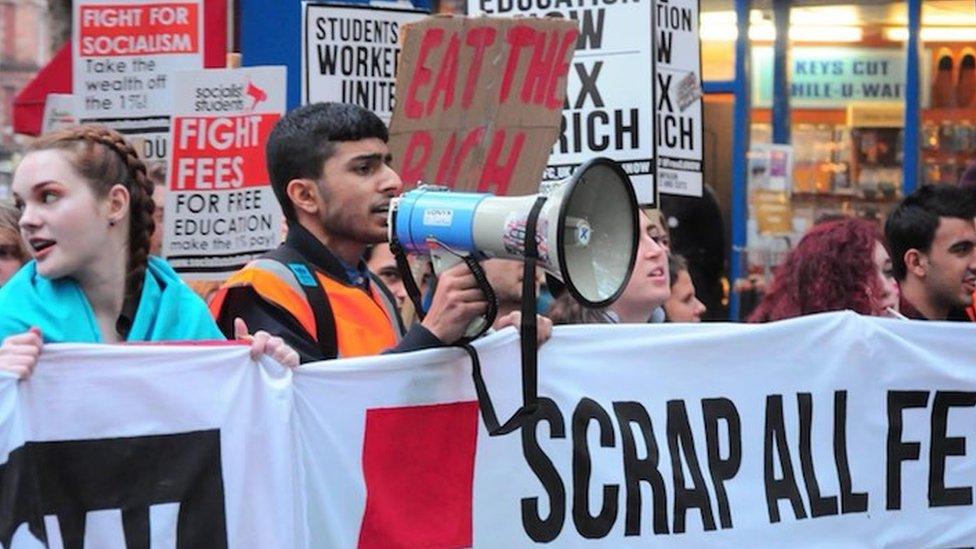
Hasan (C) argued that youth participation in elections has been high in countries where under-18s can vote
Being able to shape those decisions is what organisations such as Young Labour and its Liberal Democrat counterpart have long been campaigning for.
"It's ridiculous that at 16 and 17 you can work, serve in the armed forces, or even start a family, but can't have a say on who runs the country - unless you are a member of the Conservative Party," the chairwoman of Young Liberals, Eleanor Kelly, said.
The Liberal Democrats, she said, "proudly support votes at 16, and will continue to fight to make the voices of young people heard".
These kinds of arguments hold no sway over Blake Cooper though.
A 16-year-old from Warrington, Blake said he used to support Labour but switched to the Tories "once I started reading more". Brexit ignited his interest in politics and eventually he gravitated towards the Conservative Party.
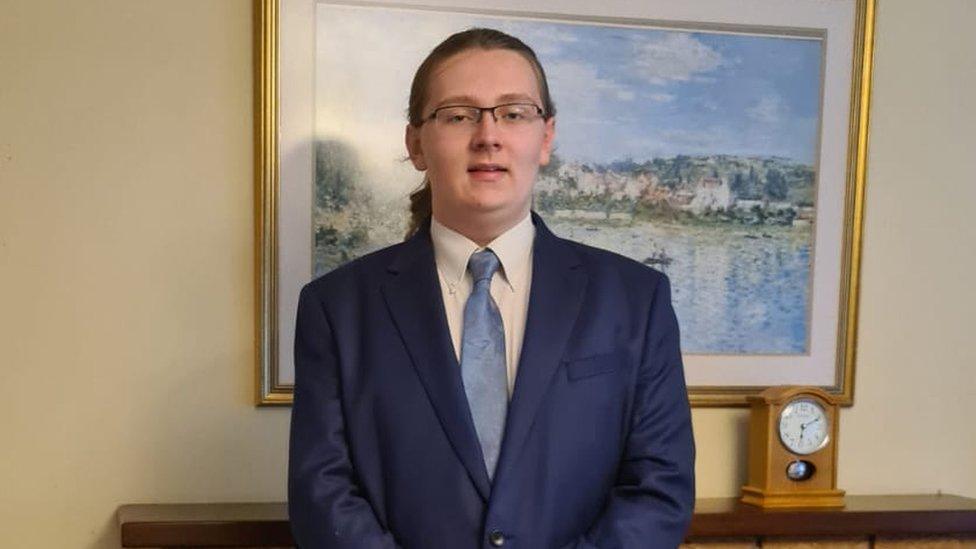
Blake said under-18s can shape politics in ways other than voting
Still, neither Mr Sunak nor Mr Truss have impressed him so far, and he was considering spoiling his ballot as a result.
"I don't like how both of them claim to be northerners," Blake said.
He was similarly indifferent about his right to vote for the next prime minister, saying: "I'd be fine if they took the vote away from me."
Countering the arguments of Labour and the Liberal Democrats, Blake said under-18s "don't necessarily have to vote to have an impact".
"They can also shape the future in other ways."
Related topics
- Published17 August 2022
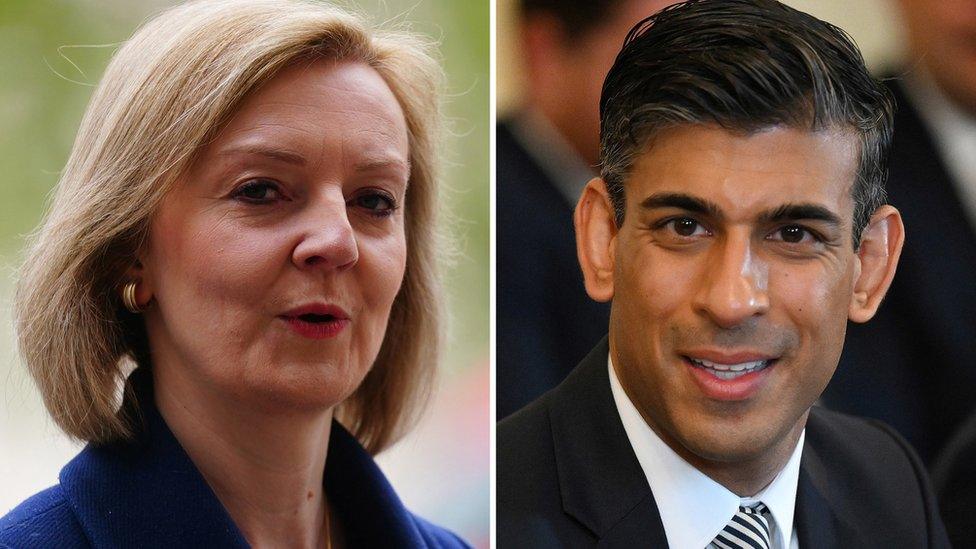
- Published17 August 2022
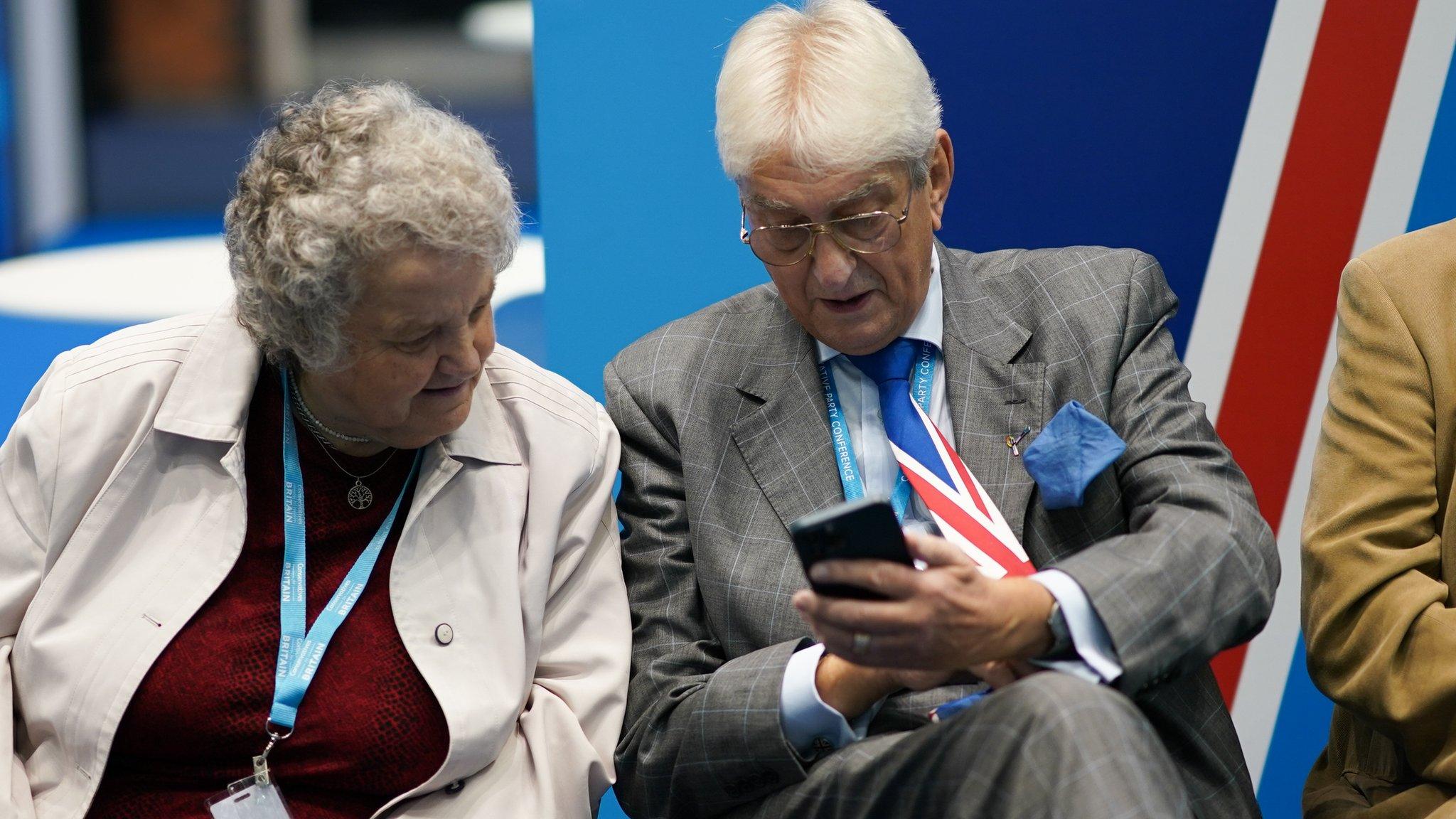
- Published17 August 2022
